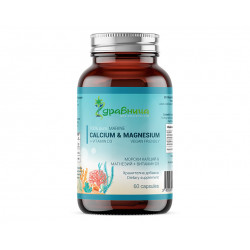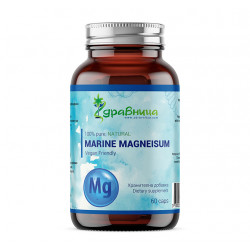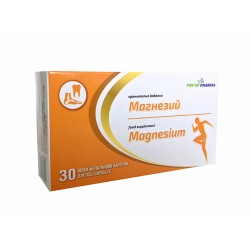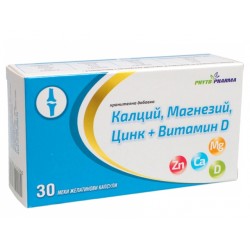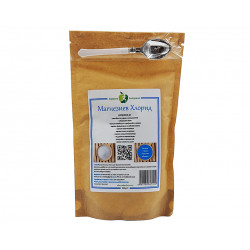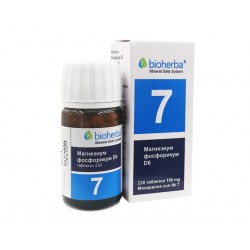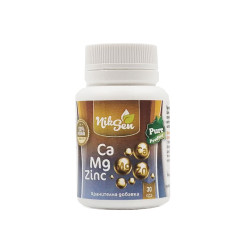Magnesium deficiency interferes with the proper functioning of the body and "unlocks" a series of serious diseases
Magnesium deficiency or hypomagnesemia has often been talked about and written about in recent years, but this does not improve the negative statistics. It turns out that in modern societies between 70 and 80% of people are deficient in magnesium without even knowing it. The main reasons for this startling fact are agricultural practices that remove magnesium from the soil, high levels of stress in everyday life, poor eating habits.
This percentage becomes even higher in the elderly over 50, the chronically ill, diabetics, those who regularly abuse alcohol, problems with the small intestine, insufficient absorption of food, those suffering from celiac disease – an immune reaction to the consumption of gluten.
Magnesium - why is it so important?
Magnesium is involved in the composition of more than 300 intracellular enzymes. Its role is key to normal metabolism, maintenance of physiological electrolyte balance, energy production, reduction of feelings of exhaustion and fatigue.
Magnesium is involved in cell division: the synthesis of DNA, RNA, ATP and proteins. It is also important for the proper functioning of the nervous system and muscles, for the health of bones and teeth. Prevents the formation of plaques on the walls of arteries, keeps blood pressure within normal limits.
Here are the most common symptoms that may indicate you have a magnesium deficiency:
Heart and blood pressure
Magnesium deficiency leads to increased blood pressure, which is a leading risk factor for more serious heart disease. Conversely, if you have high blood pressure and take extra magnesium, this, along with other measures such as a healthy diet and physical activity, will help to normalize your blood pressure.
A Harvard University study of over 70,000 people found that those who got enough magnesium, even in higher doses, had the healthiest possible blood pressure. A subsequent meta-analysis of the available studies proved that blood pressure lowering can be achieved with magnesium. Another study from the University of Minnesota specified that the risk of hypertension was 70% lower in women with adequate/high levels of magnesium.
Cardiac arrhythmia (irregular heartbeat) is another serious condition that can be caused by magnesium deficiency. Arrhythmia must be controlled in time because it can lead to heart failure and stroke.
Low magnesium levels cause calcium to build up on the walls of the arteries, resulting in heart failure or, worse, a heart attack. Magnesium's ability to prevent hypercalcification of the arteries is a major reason why it is recommended for all people at risk of cardiovascular disease.
Muscle spasms and cramps
Twitches, tremors, muscle spasms and cramps (painful cramps) are all signs of magnesium deficiency. In extreme cases, low magnesium levels can even cause seizures and convulsions.
Why does this happen? The lack of magnesium leads to greater amounts of calcium in the nerve cells, which further irritates (overexcites) the nerves of the muscles. The principle of action is the same as in the arteries: the excess amount of calcium paralyzes the nerves and muscles.
If magnesium deficiency is combined with high levels of daily stress and/or excessive caffeine use, the quantity and quality of involuntary muscle spasms increase significantly.
Constant fatigue
Although difficult to define in medical terms, constant tiredness and fatigue are another sign that the body lacks magnesium.
If, despite having managed to rest well and for a long time, you still feel physically and mentally tired, then this surely means that you have low levels of magnesium.
Mental health
Lack of enough magnesium leads to apathy, anxiety, restlessness, stress, depression, more serious mental disorders. Simply put, magnesium acts as a "brake" for the nervous system and brain, protecting them from overheating or burnout.
Another manifestation of this deficiency is related to restless sleep, headaches, migraines. Magnesium is the ultimate relaxation mineral, helping to relax the body and mind, contributing to restful sleep. In addition, magnesium is necessary for the proper functioning of GABA receptors in the brain. GABA is the neurotransmitter that allows the brain to go into a relaxed state.
Healthy musculoskeletal system
You know from biology textbooks that calcium is the most important mineral for the health of bones, teeth and nails. The latest scientific research shows that, perhaps, magnesium is even more important!
The lack of magnesium stops the synthesis of vitamin D in the body, and this vitamin, in addition to all other health benefits for the body, also has a positive effect on bone strength.
Magnesium is needed to stimulate the hormone calcitonin, which draws calcium from muscles and tissues and directs it to bones. This fact explains why magnesium helps reduce the risk of osteoporosis, arthritis, kidney stones and heart attack.
Foods rich in magnesium
The recommended daily dose of magnesium for women is on average about 310 mg, and for men - about 400 mg. For active sportsmen, pregnant and lactating people, and chronically ill people, these amounts become higher.
Eating the following foods helps you get the recommended daily dose of magnesium:
- Cocoa: raw in the form of powder or beans.
- Seeds: hemp seed, pumpkin seed, chia, flax seed, sunflower, sesame.
- Whole grains: oats, buckwheat (buckwheat), amaranth, quinoa.
- Green leafy vegetables: spinach, beetroot leaves, kale, nettles, lettuce, arugula, collard greens.
- Nuts: almonds, cashews, Brazil nuts, pine nuts, walnuts, hazelnuts, peanuts.
- Legumes: all types of beans, especially munk beans, all varieties of lentils, edamame.
- Fruits: dried figs, avocados, bananas, apples, passion fruit, jackfruit, guava.
Where to buy Magnesium?
Magnesium from a natural source can be found in "Zdravnitza".
You can place your order online. We deliver our products to products in Bulgaria, Europe, USA, Canada, Australia, Israel and Thailand.
Magnesium products can buy on local stores of "Zdravnitza".
Health store "Zdravnitza"
1000 Sofia, Bulgaria
23 Neofit Rilski str.
Health store "Zdravnitza"
1303 Sofia, Bulgaria
74 Odrin str.




